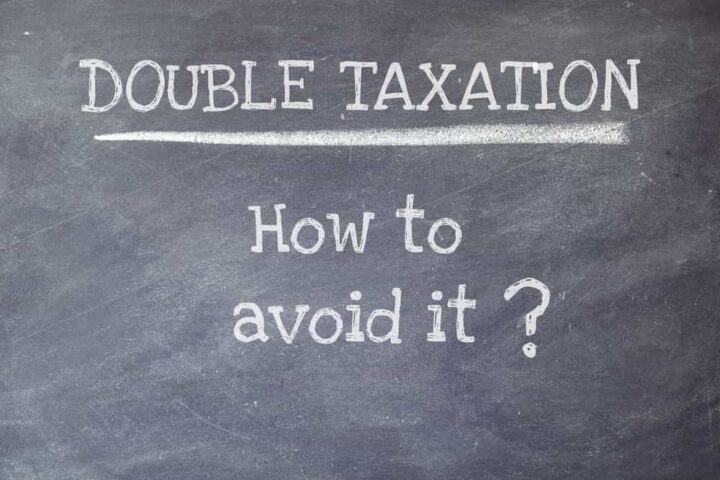
Americans living abroad often face a significant financial risk: paying taxes on the same income to both their host country and to the IRS. Known as expat double taxation, this issue creates a considerable compliance and financial burden. It exists because the U.S. taxes its citizens on worldwide income, a policy that follows them no matter where they live.
Fortunately, American expats can use established mechanisms like tax treaties, exclusions, and credits to prevent paying tax twice. This guide breaks down this complex issue and explains how to avoid double taxation on foreign income.
What Is Double Taxation?
Double taxation occurs when two different countries tax the same stream of income. For American expats, this means a foreign government taxes their local income, and the U.S. government also taxes that same income. Common scenarios that trigger this include earning a salary from a foreign employer while retaining U.S. citizenship or running a business as a freelancer abroad. The issue also extends to the corporate level.
Double taxation occurs when C-corporations pay income tax on profits and their shareholders then pay personal tax on dividends distributed from those profits. This can affect expats who own shares in C-corporations if both their country of residence and the U.S. tax the dividends.
Understanding Tax Treaties
Tax treaties are formal agreements between two countries that define which country holds the primary right to tax specific types of income. The U.S. has tax treaties with many countries to reduce or eliminate dual taxation on income like wages, pensions, and investment income.
However, most U.S. tax treaties contain a saving clause, which allows the U.S. to tax its citizens as if the treaty did not exist. Expats may need to file IRS Form 8833 to disclose their position when claiming certain treaty benefits.
Treaties also include “tiebreaker rules” that use factors like permanent home and nationality to determine a single country of residence for tax purposes in cases of dual residency.
Foreign Income Exclusion Explained
The foreign earned income exclusion (FEIE) is a key tax benefit that allows expats to exclude a significant portion of their income earned abroad from their U.S. taxes. For the 2024 tax year, the exclusion limit was $126,500.
To qualify for the FEIE, an expat must meet two primary conditions:
- The Tax Home Test: Your main place of employment must be in a foreign country.
- Residency or Presence Test: You must satisfy either the Bona Fide Residence Test by being a registered resident of a foreign country for a full calendar year, or the Physical Presence Test by being physically outside the U.S. for 330 full days in a 12-month period.
The FEIE only applies to earned income, such as salary and self-employment earnings. Expats cannot use it to exclude unearned income like interest, dividends, or capital gains.
Determining Tax Residency for Expats
A critical question for any American abroad is, do expats pay taxes in both countries? The answer depends on tax residency. The U.S. considers its citizens and green card holders to be tax residents for filing purposes, no matter where in the world they live.
Your host country will have its own set of rules to define you as a local tax resident. Therefore, understanding your status in both nations is the essential first step to applying the correct tax treaties and credits to avoid double taxation.
Basics of International Tax Law for Expats
International tax law is a set of rules that governs how countries treat income when it crosses international borders. For U.S. expats, the most important component is “citizenship-based taxation,” the U.S. policy of taxing citizens on their worldwide income no matter where they live.
Other key components include Totalization Agreements, which coordinate Social Security and pension benefits between countries to prevent double contributions on self-employment income.
These laws also govern reporting requirements, such as the FBAR (Foreign Bank Account Report), for expats who hold foreign financial accounts.
Tax Planning Strategies to Avoid Double Taxation
Expats can use several key strategies to avoid double taxation. The most effective tools include:
- The Foreign Tax Credit (FTC): This provides a dollar-for-dollar reduction of your U.S. tax liability for income taxes you have already paid to a foreign government. Unlike the FEIE, the FTC applies to both earned and unearned income, and you can carry any excess credits forward to future tax years.
- Pass-Through Entities: Business owners can prevent corporate-level double taxation by structuring their company as a “pass-through” entity, like an S-corporation or partnership. This ensures profits are only taxed once on the owner’s personal return.
- Salary Over Dividends: Corporate shareholders can receive compensation as salary rather than dividends. The company can deduct salaries as a business expense, which avoids the double tax applied to dividend distributions.
These strategies are essential for protecting your income from being taxed twice.
Finding the Right Expat Tax Services
Navigating the rules of expat double taxation requires paying close attention to the laws of two different countries. The key takeaways are to understand your tax residency, leverage tax treaties, and choose the correct tool for your situation, whether it’s the FEIE or the FTC.
Because tax laws and treaties are complex, working with a qualified professional is the most effective way to ensure compliance and minimize your tax liability. To get help with your specific situation, you can schedule a free consultation with an expert in expat tax services.
